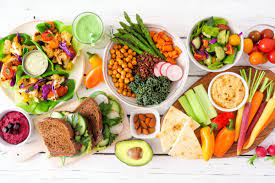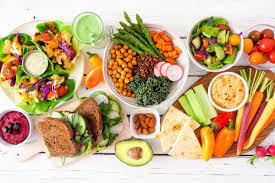Plant-based Food have gained immense popularity in recent years, as more people are opting for a healthier and more sustainable lifestyle. The history of plant-based foods dates back to ancient times, when people consumed plant-based diets for religious or cultural reasons. Today, plant-based diets are becoming increasingly popular due to their numerous health benefits and positive impact on the environment.
If you’re curious about plant-based foods and want to learn more, you’ve come to the right place. In this article, we’ll explore everything you need to know about plant-based foods, including their history, types, ingredients, spices, and health benefits.
Origin and History of Plant-based Food
Plant-based diets have been around for centuries, with the earliest known plant-based diet dating back to ancient Greece. The philosopher Pythagoras, who lived in the 6th century BCE, was a follower of a plant-based diet. He believed that eating animals was not only unnecessary but also immoral.
In India, the concept of a plant-based diet dates back to ancient times, with the practice of ahimsa, which means non-violence, being an integral part of Hinduism, Jainism, and Buddhism. The idea is to avoid harming any living creature, including animals, by following a vegetarian or vegan diet.
Today, plant-based diets are gaining popularity due to their numerous health benefits and positive impact on the environment. They are a great way to incorporate more fruits, vegetables, whole grains, and legumes into your diet.
Everything to Know About Plant-based Food
Foods Plant-based foods are foods that come from plants and include fruits, vegetables, whole grains, legumes, nuts, and seeds. These foods are pack with essential nutrients, vitamins, and minerals that are necessary for a healthy diet.
Plant-based diets are not just for vegans or vegetarians. Anyone can benefit from incorporating more plant-based foods into their diet, even if you don’t eliminate animal products entirely. Plant-based diets can improve your overall health, reduce your risk of chronic diseases, and even help you lose weight.
What are Plant based foods
Plant-based foods are foods that come from plants, including fruits, vegetables, legumes, whole grains, nuts, and seeds. They are rich in nutrients like fiber, vitamins, minerals, and antioxidants and provide many health benefits. Plant-based diets have been linked to lower rates of chronic diseases such as heart disease, diabetes, and certain types of cancer. Additionally, plant-based foods are often lower in calories and fat than animal-based foods and can be a good option for people looking to lose weight or maintain a healthy weight. Some examples of plant-based foods include apples, spinach, beans, quinoa, almonds, and chia seeds.
Types of Plant-based Food
Plant-based foods come in a variety of types, each with its unique benefits. Here are some of the most popular types of plant-based foods:
- Fruits: Fruits are an excellent source of essential vitamins and minerals. They’re also high in fiber and can help improve digestion.
- Vegetables: Vegetables are pack with nutrients and are low in calories. They’re an excellent source of vitamins A, C, and K and can help reduce the risk of chronic diseases.
- Whole grains: Whole grains are high in fiber, protein, and essential vitamins and minerals. They can help lower cholesterol, reduce the risk of heart disease, and promote healthy digestion.
- Legumes: Legumes are high in protein and fiber and are an excellent source of essential nutrients like iron and zinc. They can help improve heart health, promote weight loss, and reduce the risk of chronic diseases.
- Nuts and seeds: Nuts and seeds are a great source of healthy fats, protein, and essential nutrients. They can help improve heart health, reduce inflammation, and promote healthy digestion.
Ingredients and Spices
Plant-based foods can be an assemble of a variety of ingredients and spices to create delicious and nutritious meals. Some popular ingredients used in plant-based cooking include tofu, tempeh, seitan, and plant-based milk like almond, soy, or coconut milk. Spices like cumin, turmeric, and paprika can add flavor and nutrition to your meals.
What to Eat Plant-based Food With
Plant-based foods can be consume on their own or combination with other ingredients to create delicious and nutritious meals. Some popular options include:
- Salads: Salads are an excellent way to incorporate more vegetables into your diet. You can add a variety of vegetables, fruits, nuts, and seeds to create a flavorful and nutritious salad.
- Stir-fries: Stir-fries are a great way to incorporate vegetables, legumes, and whole grains into your diet. You can use a variety of spices and sauces to create a delicious and healthy meal.
- Soups: Soups are a great way to incorporate a variety of vegetables and legumes into your diet. You can make a hearty soup with lentils or beans or a lighter soup with vegetables and herbs.
- Smoothies: Smoothies are a great way to incorporate fruits, vegetables, and nuts or seeds into your diet. You can add plant-based milk or yogurt for added creaminess and nutrition.
Plant-based Food vs Vegan
Plant-based Food and veganism are use interchangeably, but they are not the same. Veganism is a lifestyle that seeks to eliminate all animal products, including meat, dairy, eggs, and honey. Plant-based diets, on the other hand, focus on consuming foods that come from plants, but may include some animal products.
Plant-based diets are more flexible than veganism and can be tailor to fit individual needs and preferences. For example, some people may choose to include some animal products, such as eggs or dairy, in their plant-based diet.

Health Benefits
Plant-based Food diets have numerous health benefits, including:
- Reduced risk of chronic diseases: Plant-based diets can help reduce the risk of chronic diseases like heart disease, diabetes, and certain types of cancer.
- Improved digestion: Plant-based foods are high in fiber, which can help promote healthy digestion and prevent constipation.
- Weight loss: Plant-based diets are often lower in calories and can help promote weight loss.
- Improved mental health: Plant-based diets have been linked to improved mental health, including reduced symptoms of depression and anxiety.
Nutritional Values
Plant-based Food are packed with essential nutrients, including:
- Vitamins: Plant-based foods are rich in vitamins like A, C, K, and B vitamins.
- Minerals: Plant-based foods are a great source of minerals like iron, zinc, calcium, and magnesium.
- Fiber: Plant-based foods are high in fiber, which can help promote healthy digestion and prevent chronic diseases.
- Protein: Plant-based foods like legumes, nuts, and seeds are an excellent source of protein.
popular Plant-based Food
Here’s an overview of some popular Plant-based Food that you can incorporate into your diet:
- Buddha Bowl: A Buddha bowl is a colorful and nutrient-dense meal that typically consists of a combination of grains, vegetables, legumes, and a sauce. Some popular Buddha bowl ingredients include quinoa, brown rice, roasted sweet potatoes, chickpeas, avocado, and a tahini dressing.
- Veggie Burger: A veggie burger is a plant-based alternative to a traditional meat burger that is typically made with a patty made from beans, grains, or vegetables. You can customize your veggie burger with toppings like avocado, tomato, lettuce, and vegan cheese.
- Tofu Stir-Fry: Tofu stir-fry is a popular plant-based meal that consists of tofu and a variety of vegetables stir-fried together in a flavorful sauce. You can customize your stir-fry with your favorite vegetables and a variety of spices and sauces.
- Vegan Lasagna: Vegan lasagna is a plant-based alternative to traditional lasagna that typically consists of layers of pasta, vegan cheese, and a tomato-based sauce made with vegetables like zucchini, mushrooms, and spinach.
Plant-based Food
- Lentil Soup: Lentil soup is a hearty and nutritious plant-based meal that is typically made with lentils, vegetables, and a variety of spices. You can customize your lentil soup with your favorite vegetables and spices to create a delicious and satisfying meal.
- Chickpea Curry: Chickpea curry is a flavorful and hearty dish that’s perfect for any meal. You can use canned or cooked chickpeas and add in your favorite veggies like spinach, tomatoes, and bell peppers. Serve it over rice or with some naan bread on the side.
- Tofu Scramble: Tofu scramble is a great plant-based alternative to scrambled eggs. It’s easy to make and tailor with your favorite veggies and seasonings. You can also add in some vegan cheese or nutritional yeast for extra flavor.
- Vegan Chili: Chili is a hearty and satisfying meal that’s perfect for colder days. You can use a combination of beans, veggies, and spices to create a flavorful and filling dish. Serve it with some cornbread or a side salad.
- Stuffed Sweet Potatoes: Stuffed sweet potatoes are a great way to incorporate a variety of flavors and textures into one meal. You can stuff them with anything from black beans and salsa to quinoa and roasted veggies.
- Vegan Pizza: Pizza can easily be made plant-based by using a vegan crust, tomato sauce, and toppings like mushrooms, bell peppers, onions, and vegan cheese. You can also experiment with different sauces and toppings to create your own unique pizza.
These are just a few examples of popular plant-based meals. There are many more options out there, so don’t be afraid to get creative in the kitchen and experiment with different ingredients and flavors!
Frequently Asked Questions
Here are some common questions about Plant-based Food:
- Can I get enough protein on a plant-based diet?
Yes, you can get enough protein on a plant-based diet by incorporating protein-rich foods like legumes, nuts, and seeds.
- Are plant-based diets expensive?
Plant-based diets can be affordable, especially if you focus on whole foods like fruits, vegetables, whole grains, and legumes.
- Are plant-based diets suitable for children?
Plant-based Food diets can be suitable for children if they are properly plan to ensure that children get all the necessary nutrients for their growth and development.
Conclusion
Plant-based Food are an excellent way to improve your health, reduce your environmental impact, and promote a sustainable lifestyle. By incorporating more plant-based foods into your diet, you can enjoy numerous health benefits and create delicious and nutritious meals. Whether you’re a vegan, vegetarian, or just looking to incorporate more plant-based foods into your diet, there are plenty of options to choose from. So why not try adding more plant-based foods to your diet and see how they can improve your health and well-being?
See Also: https://infoblog4all.com/risotto-ai-frutti-di-mare/


Good job, keep it up
This article is expository and educative.
I love the health benefits of this plant-based food. Thanks for sharing 😘